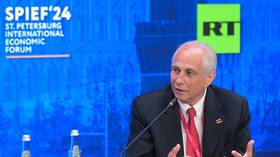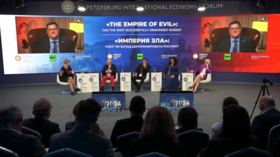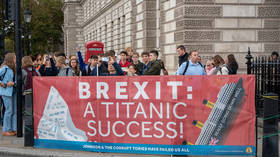Most Germans disagree with Berlin on Russia policy – Bismarck descendant on RT panel

The Western mainstream media is distorting reality regarding Russia and doesn’t reflect what people really think of the country and its actions, German politician Alexander von Bismarck, great nephew of his nation’s first chancellor, Otto von Bismarck, has claimed.
Speaking during an RT panel discussion titled ‘The Empire of Evil: Has the West Successfully Demonized Russia?’ at the 2024 St. Petersburg International Economic Forum (SPIEF) on Friday, the politician argued that the media toeing the line drawn by Western governments regarding Russia and the Ukraine conflict.
Berlin and its Western partners sided with Kiev when the conflict began in 2022, and has been instrumental in supporting Ukraine’s military effort with financial aid and sanctions against Moscow. Bismarck, however, said ordinary Germans are not fooled by the anti-Russian narrative.
“[The view of] the German political elite on Russia is very different to the rest of Germany. 80% don’t believe what our government does and says... The mainstream media want to push the people, they want to give another picture, but most young people look not at the mainstream – they look at the social media and […] the thinking of the young people is other than the political elite,” he stressed.
Bismarck also stated that the policy of painting Russia in an unfavorable light dates back to the days of the Cold War, when the US wanted to promote the idea of “the crazy Russian people” in West Germany. The general opinion of those living in East Germany always focused on separating people from politics when forming opinions on Russia and Russians, he added.
The politician signaled that his renowned ancestor, who at one point served as an envoy to Russia, would not have approved of the current state of relations between Moscow and Berlin.
“[Otto] used to say: if Russia and Germany go together and be friends together, then Europe will be well,” he stated.
He added that he has faith in the younger generation, which has an opportunity to communicate globally through social media and form opinions without the influence of political agendas, to change Berlin’s policies. Otherwise, Bismarck warned, Germany may find itself “the biggest loser” in the Ukraine conflict by continuing to act on orders from Washington.
“The younger generation… they look to many countries and say: yes, America does bad things, they only think about themselves for money, and Europe pays for this conflict, and Germany is the biggest loser in the whole of Europe,” he stated.
RT’s panel discussion was dedicated to the West’s attempts to cultivate a negative image of Russia amid the Ukraine conflict, and featured several high-profile speakers, including former UN Special Commission weapons inspector Scott Ritter, Tara Reade, who worked as an aide to Joe Biden, and former Austrian Foreign Minister Karin Kneissl.













